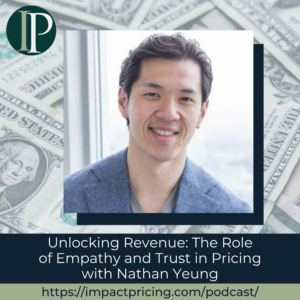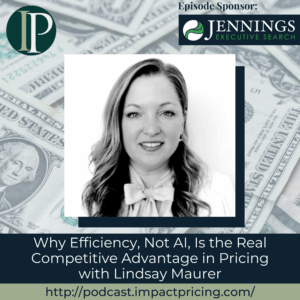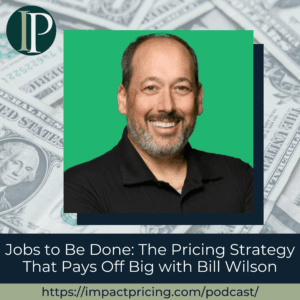With over six years of experience as a leader in marketing operations, Nathan Yeung helps mid-market businesses build, enhance, or support their marketing functions and drive value creation. As the Vice President, CMO Services at Find Your Audience Marketing Partner, he leads teams of marketing managers, graphic designers, media buyers, coordinators, and freelancers to develop and implement marketing strategies for organizations across various industries.
In this episode, Nathan shares how empathy is crucial for understanding and communicating value, which directly influences pricing and client trust. He emphasized that many web pages fail because they attempt to appeal to everyone rather than focus on a specific audience and problem. Additionally, he advised against charging too little, suggesting that higher rates can be justified when trust is established, and recommends offering multiple pricing options to highlight the value of the primary choice.
Podcast: Play in new window | Download
Why you have to check out today’s podcast:
- Learn to understand and address your customers’ pain points to significantly impact your pricing strategy and boost trust, leading to higher revenue.
- Find out why many web pages fail to convert and get actionable advice on how to create focused, empathetic web content that resonates with your target audience.
- Explore how trust plays a crucial role in client relationships and how it can influence pricing decisions, helping you secure higher-value contracts.
“Never give a single price. Think about creative ways to give at least three and make your obvious choice your bottom line.”
– Nathan Yeung
Topics Covered:
01:07 – Talking about his disciplined approach to health
02:01 – How he got into pricing and his perspectives on pricing
03:53 – Discussing his approach to helping B2B companies “discover revenue”
06:22 – The reactions and learning opportunities that come when a client quickly accepts a price offer
07:48 – The importance of truly understanding and communicating value when helping businesses discover revenue
11:17 – Value creation in B2B and B2C contexts
14:03 – Expanding on the concept of having marketing take on internal communications
15:08 – Two key issues why web pages fail and bringing in additional point about the “curse of knowledge”
18:22 – Discusses the concept of pricing and positioning in business
22:22 – Trust and how it relates to pricing and business growth
23:04 – Talking about his book, ‘The Lazy Consumer’, and discussing the concept of trust
24:49 – Elaborating on the importance of empathy in sales and how it can trigger a response from customers
25:53 – Underscoring the crucial link between trust and pricing
27:20 – Nathan’s best pricing advice
Key Takeaways:
“When you forget about that [people are human], you get a lot of people locked into this state of logical thinking. And when you’re too logical, it’s hard to generate a lot of value. Because when they’re logical, they’re being highly critical.” – Nathan Yeung
“Understanding your ideal customer profile and really understanding their true pain points and where they are in a business, you can understand value.” – Nathan Yeung
“Value makes you really be empathetic, and you really have to understand what is valuable to your customer.” – Nathan Yeung
“Just because there’s a quantifiable change that is valuable, that does not necessarily mean that person values that the most.” – Nathan Yeung
“HR is great for compliance and process and all that kind of lovely stuff, but they’re really not great marketers.” – Nathan Yeung
“This idea of building culture, while it’s important for HR to take care of that and be the accountable part of that, the reality is that marketers are likely the more important person to actually bring that message to market, which is the company in itself.” – Nathan Yeung
Connect with Nathan Yeung:
- LinkedIn: https://www.linkedin.com/in/yeungnathan/
- Website: https://www.findyouraudience.online/
Connect with Mark Stiving:
- LinkedIn: https://www.linkedin.com/in/stiving/
- Email: [email protected]
Full Interview Transcript
(Note: This transcript was created with an AI transcription service. Please forgive any transcription or grammatical errors. We probably sounded better in real life.)
Nathan Yeung
Never give a single price. Think about creative ways to give at least three and make your obvious choice your bottom line.
[Intro / Ad]
Mark Stiving
Welcome to Impact Pricing, the podcast where we discuss pricing, value, and the often time-relationship between them. I’m Mark Stiving, and our guest today is Nathan Yeung. Here are three things you want to know about Nathan before we start. I love his LinkedIn banner. It reads, I help B2B companies discover revenue. He’s a VP of CMO services at Find your Audience Marketing Partner. He’s a fractional CMO, and he’s a health optimization freak. Welcome, Nathan.
Nathan Yeung
Thanks, Mark. I know the last part’s funny.
Mark Stiving
The last part was an insult. I did, I want everybody to know, he told me those words.
Nathan Yeung
I think a lot of people look at me funny when I talk about my diet and my regimented bulk and cut cycles that happen at least once or twice a year. And people go, why do you do that? And I go, well, I’m just going to say this to start. When you learn how to bulk and cut the first time you feel like it’s a fluke, the second time you go, oh, maybe this isn’t a fluke. And then the third time Mark, you were just talking about how you like to enjoy life. Now when I, on my bulking cycle, I can enjoy all the food without feeling any of the guilt because I have this control now that I know I can lose it on the third time. So as much as it’s crazy, it’s like all the anxiety and the guilt from eating is gone, and I love that.
Mark Stiving
Nice. Well, let’s see if we can get rid of some anxiety and guilt around pricing for a second. And let me ask you the ultimate question. How’d you get into pricing, or do you even think of yourself as being in pricing?
Nathan Yeung
I think pricing, as you know you go to school for it. If you ever went to marketing or if you took a business class, it’s the four Ps. It’s right then and there. And I think pricing plays such a huge role in terms of framing and anchoring of products and positioning and pricing also comes down to value. How do you value yourself? I call myself a fractional CMO, but the reality is, I have a firm, so not only do I just do it, but I also have teams that help execute. And people go, well, do you charge hourly? Do you charge it on a project basis? How do you do that? Pricing plays such a huge role in marketing. It’s hard for me to get around that, but the science behind it, the strategy, the psychology behind it, I think is so complex. And I think a lot of people have a hard time trying to understand that, which is why I think they default to hourly, just like, oh, we’ll do hourly pricing, but they don’t recognize how much you’re shooting yourself in the foot by doing that. And also how much it pigeonholes your business. Just in terms of even how you negotiate or even how you sell it pigeonholes you so much.
Mark Stiving
Yeah, we could talk about hourly for a while and why it’s so horrible, but I’ll tell you, the number one thing I hate about hourly pricing is that it puts you at odds with your customer because your customer wants you to bill fewer hours and you want to bill more hours. And every time you say, hey, let’s talk about health on the phone today. They’re thinking, are you charging me for this? So it just ruins the customer relationship.
Nathan Yeung
It’s too bad. Lawyers don’t listen to that advice.
Mark Stiving
It really is. Okay, so, I said this in the opening, and I truly am, I love your LinkedIn banner. I help B2B companies discover revenue. Now, I love that because I think pricing is probably much bigger than most people think of pricing. But I want to hear from you, what do you mean when, or how do you go about discovering revenue?
Nathan Yeung
I think a lot of businesses try to reinvent the wheel because there’s so many shiny objects. And if you think about it, my job as a marketer is to make that object so shiny that it actually grabs your attention and forces you to want to do something. And I think we’re almost at odds with ourselves. Marketers, we do such a great job where we get a bunch of CEOs wanting to do new things, but at the same time, as a marketer, we also know there are ways for you to maximize low hanging fruit and really focus on those things. And a great way that you can do that is, Mark, you talk about incremental price increases a year. You see that in all luxury brands. There’s a reason why they do that. In other terms, they call it limit testing, right?
If you never ‘limit test’ your price, you actually never recognize how much your market is actually willing to spend on your product. And so therefore, you sometimes get stuck, right? So many of the companies that I work with practice that, and that’s an easy way to discover revenue when you increase your prices 3% every single year. It’s immaterial at the end of the day to your customer, but to you, in the long run, it’s very, very much material. So that’s a great way of discovering revenue. Discovering revenue in another way is just creating pricing packages. I think often I talk to a lot of service space providers, and when they’re selling their service, they’re only selling one package. And I go, why are you doing that? And that’s because, well, that’s the service I provide them. And I go, look, I get that.
That’s, you’re probably correct, but if you don’t give a consumer your potential customer choice, you don’t recognize how much more you can charge. Mark, I don’t know if you’ve ever come across this, but there’s that whole negotiation thing where you never want to accept someone’s first offer because it actually makes them feel bad, right? So when someone goes, I’m going to pay you $2,000, and you go, yes, the person who just made that offer actually feels bad because psychologically they feel like they’ve gotten hooped, like they didn’t do a good enough job. But if you give them a choice and you allow them to make that choice, not only do you have an opportunity of them being more happy after the transaction, you also have an opportunity of potentially making more money because you’ve given them that choice. And I think that’s another way of discovering revenue. So outside of pricing though, there’s tons of ways.
Mark Stiving
Wait, I got to, I don’t know, what do I want to say? Although I’ve heard the studies and I kind of agree with them, I have to tell you, when I tell someone my price and they say, yes, I’m happy, I’m really happy, right?
Nathan Yeung
I think some people fall under that immediate sense of, ‘Oh my gosh, I could have potentially gotten more if they agreed to it too quickly,’ like, ‘Oh, it’s $5,000 to go.’ Yeah. You go, ‘Oh could I have done 5,500? Could’ve done 5,750.’
Mark Stiving
So here’s how I interpret that. If I ask you for $10,000 and you say, yes, really fast, my next client, I’m asking for 12,000.
Nathan Yeung
Fair.
Mark Stiving
That was just a learning experience. Thank you. I appreciate it.
Nathan Yeung
Yeah, it was in a negotiating book. I can’t remember which one it was. But I always found that interesting. But going back to, I think there is so much learning experiences around price, and I think you just pointed out a great one. When someone accepts so quickly, you should probably ask yourself, was that too low? Did I sell just better this time? Is that how much value I’m creating? Is there more value I can create? What is the value of that? And I think there’s definitely learning to increase your price, exactly what you do, Mark.
Mark Stiving
Yeah. So, I love what you just talked about, selling value. And so I want to bring that up for a second. Because I would expect that one of the big ways that you help discover revenue is you help find the right clients by communicating value properly, or you help train salespeople how to communicate value properly. Let me let you blather on for that, on that topic for just a second or two.
Nathan Yeung
I think it’s interesting because when we come out of school, we kind of learn to talk a certain way, and we kind of forget that people are human. And when you forget about that, you get a lot of people locked into this state of logical thinking, and when you’re too logical, it’s actually hard to generate a lot of value, because when they’re logical, they’re being highly critical. And so really understanding your ICP, your ideal customer profile, sorry for using acronyms and really understanding their true pain points and understanding where they are in a business, you can understand value. And so there’s a difference between a feature that generates a quantifiable observable change for the positive impact of their life. So whether that’s increasing conversion rates, increasing marketing qualified leads, increasing sales qualified leads, whatever number of KPI you want, and the true value to them, which actually could be that, but it’s actually the outcome potentially of that.
So if you talk to a VP of Marketing and you said, ‘Hey, I’m going to double or triple your MQL this year,’ is the value that, or is the value the outcome that they get from that outcome, is that what’s most important to them. And I think that’s why value is such an interesting conversation, because value makes you really be empathetic, and you really have to understand what is valuable to your customer. Because just because there’s a quantifiable change that is valuable, that does not necessarily mean that person values that the most. So understanding value is so important because if you don’t do that, then you don’t know how to price that well, right? And that’s why some things are so invaluable, they’re priceless, right? And that’s why a lawyer says, ‘Hey, you could hire me or you could hire so and so,’ but what if I could tell you, ‘99% of the time I end negotiations with your partner within two weeks.’
And that means you have peace of mind. Everyone wants the divorce to be over with. That’s an easy value add, right? That’s a value outcome that everyone wants. But that peace of mind is actually probably the most valuable thing. The fact that after two weeks, that individual no longer needs to think about this incredibly painful thing in their life. And so that’s why I think value plays a role. If you don’t understand the highest value, which may not be the one that you can measure the most, and maybe an outcome or an actionable item that happens afterwards, then you’ll have a harder time understanding how much they’re willing to pay for that.
Mark Stiving
Yeah. I thought that was a fabulous answer. Let me add some nuance to the first answer you gave, if I may. And that is, you talked about the world of B2B, right? I’m going to increase MQLs. So MQL is a result we get from having a product or feature or capability or something like that. What’s the real value? And I think in the world of B2B value is measured in incremental profit, right? So how much more profit did I make the company if I could double your MQLs, does that turn into double the revenue or does the conversion rate change? So, if we could turn that into incremental profit, that makes it really good. In the second example, in the B2C example, ‘Oh my gosh, you can’t do that,’ right? How do you measure the incremental profit of a divorce or a breakup, right? So you just can’t do that. And so now it’s what intangibles are most valuable to the client. And so I think that’s the hardest part.
Nathan Yeung
That’s a great addition to what I said, and I’ll add one more thing. So my business started off as a value creation engine. And the reason why I said that was because I wanted people to stop thinking about marketing as purely an MQL-SQL activity. I wanted people to look at the fact that marketing can unlock value within the organization in multiple different ways. And you just brought up a great point, Mark. But the other way that I have worked with companies is, a lot of times you have HR teams create internal communications. And if you think about that, it’s kind of silly. HR is great for compliance and process and all that kind of lovely stuff, but they’re really not great marketers. And so this idea of building culture, while it’s important for HR to take care of that and be the accountable part of that, the reality is that marketers are likely the more important person to actually bring that message to market, which is the company in itself.
And so, I once had a conversation with a private equity firm. I said, if I could decrease your turnover by 40%, how much does that, what’s that value to you? Right? And they kind of fumbled over themselves because I brought in an angle of marketing that they never thought about, and we all know that, or there’s a lot of stats out there where the average cost of losing an employee is like five to seven months of their salary. So, it’s pretty sizable for most organizations. So I could decrease it, this and that kind of pay for myself, right? Another way that you can generate value is by increasing the efficiency of the sales team. And they go, what do you mean by that? I’m like, well, let me know. Like, how good is your sales team actually in organizing their marketing materials and keeping them up to date?
Well, probably not very good. I was like, okay, well, what if I could make them 10 to 20% more efficient? What does that mean? I’m not contributing to an MQL right now, but I’m contributing to your operations, which is kind of a part of my background in operations. So I always try to educate, but the problem with this Mark. Now, putting back my marketing hat, the reason why I go revenue generator is because there’s less education required. But you are absolutely correct in the sense that marketing in itself can generate value in an organization in more than one way. But the most well known way is MQL as and SQL in revenue. If I start talking about how I can decrease turnover, people get really confused, and then it becomes an uphill battle. And that’s not a battle that I want as a marketer.
Mark Stiving
And by the way, I’ve never heard of marketing taking on the role of HR’s communication, but by the way, I think it’s brilliant, right? But, the idea of having marketing do the internal communications for a company is pretty fascinating.
Nathan Yeung
Yeah. It’s simple. If you think about it, like our job is to communicate and to sell. And if you think about internal communication, the whole point is to increase consumption. If you increase consumption, it means more people are aware of the policies, the insurance programs you have, the benefits, the culture of the organization. So if you’re just busting out this text-formatted, non-copywritten culture piece your uptick in consumption is probably going to be pretty low. If you make it fun, vibrant, and essentially like an ad, you would expect higher uptake, you’d expect actually people to remember it more. So therefore, if they remember it more, they’d likely be able to practice it more. If they practice it more, you’d assume culture would be better. So this idea where you have a bunch of HR people communicating on mass to sell a message doesn’t actually align.
Mark Stiving
Yeah. Okay. So let me change topics briefly. So you’re a marketing guy, marketing expert. Can you tell me why most web pages suck? I have an answer, but I want to hear yours.
Nathan Yeung
I think most web pages suck because I think most companies hate the idea of being hyper-focused on a single page. And that’s where essentially you’re losing people. And I think the one thing that we also have is we all have spotlight syndrome, where we think that the world is viewing us every day, that, for some reason, every single person, like let’s just say I am a SaaS company that sells to legal. That founder for some reason feels like every single major law firm is opening up their website every single day to read about them. But that’s not true. They’ll get maybe a couple visits a day and maybe if there’s an interest, they’ll see it. And so there’s this constant fear of, ‘Oh, if I don’t talk about everything we do, we’re going to lose this opportunity.’
And the reality is, all you end up doing is you end up being a bit like a Chinese restaurant that’s serving Italian. You’re going to off the Italians and you’re going to off the Asians because you’re doing neither good. So that lawyer who ultimately comes to your webpage is going to see your lovely offering, but they’re not going to see the depth required to fulfill that need that they have, right? And so therefore they’ll graze over it and they won’t be convinced, and no trust will be developed amongst you and your potential customer. So I think that tends to be the issue. One is, most owners and entrepreneurs have an overconfidence bias in themselves, so therefore they think that they’re right. So they’ll think that having a general message is important. So that’s probably why it sucks. And then two, they’re not marketing experts and they’re not willing to actually look into the details of the fact that in order for someone to trust you, you have to be incredibly empathetic.
Which means if everything on that webpage doesn’t hit, in that user’s brain kind of a trigger, they’re not going to feel like you know them very well, which means they’re going to have to spend more time trying to figure out why they should trust you, which means they’ll just either leave the webpage and think you suck. Or if you somehow grab them in, in another part of your funnel, you get another opportunity to educate them. And most entrepreneurs will be like, ‘Oh, well no, it’s more important that they know everything that we do.’ Well, that’s wrong, right? That’s like, you’re never going to go to a neurosurgeon who also is an ENT doctor who’s also an ophthalmologist who’s also doing braces on the weekend. There is something really uncomfortable going to a doctor that does all those things because you want a specialist. That’s all we ultimately want cues that imply that there’s a high probability that they will serve our needs. And when you’re a generalist, you don’t get that benefit. So I think that’s why most people suck because we’re overconfident and we think general works better, and therefore we do that.
Mark Stiving
By the way, I agree with everything you said, but I’m going to add one more. And that is, I think that most companies have the curse of knowledge, and so they think they can list a product or product feature, and everybody knows what that does for them. And what they completely forget is that our customers tend to be novices. They don’t know our products, they don’t know as well as we do. And so we’re not speaking about the customer’s problems.
Nathan Yeung
Yeah, absolutely, I think you put much more simply than I did. But you’re absolutely correct. Now, I will say there are some industries where that isn’t true. Like manufacturing, software for sure, a lot of people are very technical already, and that’s where it gets really even more confusing as to what does your homepage look like when you’re speaking to such a technical user?
Mark Stiving
Right? And so you have to know who the audience is, right? I know a company that’s called something like that.
Nathan Yeung
It was funny, that’s actually how we came up with our name, right? We came up with this, was like, why don’t we just call it find your audience, like to find the people that matter?
Mark Stiving
Let’s talk about that for just a second. In the world of pricing one of the things that companies do a lot is we charge low prices too low prices. And it’s because we’re afraid we’re going to lose a deal. And I often think, well, why don’t you just sell to the people who want to pay you more? Isn’t that your real audience? So, how does that fit with the way you guys do business?
Nathan Yeung
So, I think that a lot of that falls into the maturity of the business, Mark. And I think it also falls into a kind of just well-known strategy, I think within operations. And what you’ve said is absolutely correct, right? So that’s why you look at private equity funds and they’ll be like, ‘Hey, we don’t work or do any deals that are not any less than a hundred million dollars,’ because deploying a hundred million dollars versus deploying $5 million, the amount of work required to do the diligence, doing the operations, it’s all the same. So to them it’s like, ‘Hey, I’m only going to deal with a hundred million dollars,’ because that makes sense at our scale. And so when you’re starting off, it does make sense to take that $500 a month client because you’re starting off and you have no idea and you’re just trying to be hopeful.
And then there’s the point where you start realizing, well, that $2,000 client that I just landed the month later is actually the same amount of work. And then you go, well, why am I working with that $500 when I worked with that 2,000? So I think a lot of that is also just that learning experience and the maturity of that business. And also positioning. I think a lot of times people don’t recognize that if you don’t charge enough, you don’t actually have enough margin to deliver that level of service that is required, which is where I have a saying like, the middle is where you go to die. And it’s a positioning conversation, not only in pricing, but also in market positioning and just general qualities and features. And I tell a lot of companies, they’re always like, ‘Oh, there’s an opportunity in the middle.’
I want to be that person who provides high level service, but at a mediocre price. And I go, yeah, but then if you look historically, and you know what the recession right now COVID is over, is all great examples of that. All the companies that are on the extreme ends of the spectrum did well. All the companies in the middle got squeezed. And there’s a reason for that. And I think pricing and positioning plays a huge role into your operations. And you don’t recognize this until you get squeezed, but there’s a reason why you charge low and your operations are fundamentally built around that. And there’s a reason why you charge high and your operations are built for that. And typically when you charge in the middle, your operations does not very good. Like, does not usually operate very well because you’re trying to do something without room to breathe or you’re doing something that’s just not really that economical or too risky. So then you end up getting squeezed out. So I think charging a lot, if you want to provide that level of service should always be what you should be looking for and what you’re striving for, because the level of service that is required is the same as that $500 person. But if you’re doing the $500, you just have to recognize that you need to change your operations to meet that model.
Mark Stiving
Yeah. You’ve got to have the system in place that says, look, I’m not really spending that much time with you. Yeah. To my solopreneur friends out there, leT me give you a quick hint. Something that I always talk and teach is that charge whatever rate you want to normally charge. And when you get to where you’re working 30 hours a week, raise your rate, right? Because it’s totally okay to lose customers and win the next customer at a higher rate.
Nathan Yeung
And also don’t be ashamed that you have to do the smaller contracts. I think some people are, and I go, ‘Look, everyone starts somewhere and you need case studies, you need proof,’ right? So the three prongs of the FYS framework are trust, operations, and strategy. And on the trust part, it’s what are you doing so that people trust you? Because that’s really the fundamental part of marketing. If my marketing doesn’t increase trust, then I’m not doing a good enough job. So if you don’t have any customers and you’re not known in that industry, you have to do something to prove to someone that you’re capable of achieving a desirable outcome.
Mark Stiving
Yeah, I think that’s great. And I’d never heard before that empathy creates trust. I like that phrase that you used earlier.
Nathan Yeung
So, I’m writing a book, it’s called, The Lazy Consumer. Hopefully it’ll be published by the end of this year. And I say hopefully because I have a love-hate relationship editing it right now. And a part of it is, what does trust really mean? And in Harvard, there’s actually this lovely triangle that says, trust is made of three prongs, which is logic, empathy, and authenticity. And empathy I thought was so interesting because when you think about it, empathy means you’re actually talking about their pain points. And if you actually take empathy and you go and you translate that into what marketing does that actually represents empathy. It’s ‘ being able to talk about those benefits in such a way that it is impactful to that user, which basically is actually empathy. If I can say, ‘Hey, I know how much this divorce is hurting you, but I know it’s not the divorce that’s the most painful, it’s how long it drags out, that’s more painful.’
And then you see that person go, ‘Oh, you’re right.’ You know what, we’ve already been through the hard part. This isn’t the hard part. The hard part is the fact that I have to keep having this conversation now every week and it just nags on me, right? And that’s what’s really eating at me. And that is actually empathy, because now you’re talking to someone, you’re saying, ‘Hey, I actually know what’s really bothering you, and I am showcasing that I know what actually is your biggest pain point right now without you telling me.’ And that is a form of empathy. And so if I can demonstrate that in a product, that means I feel like they know me, which means I’ll generate trust from them.
Mark Stiving
Yep. I love that answer because I’m often working with my clients to figure out what problem do you solve? What result are you going to achieve and what’s the value of that, right? And the place where everybody fails is what problem do you solve? And when you can start to truly articulate that, that’s where you get the empathy that you’re talking about now, which I think is just awesome.
Nathan Yeung
And I think everyone who’s ever done a sales call, I think if you just think about this very intuitively that customer switches as soon as you say something that triggers a switch in their brain, which is likely an empathetic comment, right? ‘Oh, I know that turnover costs you a lot of money.’ And they’re like, ‘Why is he talking about turnover?’ It’s like, ‘Oh, it costs you like $70,000 every time you lose an employee.’ He’s like, ‘Oh, he’s right,’ right? And then you go, well, that’s probably pretty expensive. You’re a two or $3 million company, you lose two or three employees, that’s $210,000 a year. How does that feel? And he’s like, yeah, it sucks. That’s empathy, right? Every time you can talk in their shoes about their pains, that’s empathy. And typically when you do that, you’ll always see a switch in that individual. And that’s because they’re actually starting to trust you. They’re like, ‘Oh, they are getting my problem. They actually know how to articulate it.’ So therefore I have trust that that individual likely can come up with recommendations that will fix those problems.
Mark Stiving
Okay. Let’s bring this back to pricing for a second. If someone trusts you while they pay you more?
Nathan Yeung
Absolutely.
Mark Stiving
That was like the softball there.
Nathan Yeung
Oh, that was the easiest thing in the world, Mark. I have a client that has given us their full marketing budget, including how much they pay us. So I could hypothetically increase my rates if I wanted to, but he trusts me, right? So, he knows, I’m like, ‘Look, I’m going to pay myself the rate that I need to get paid and the rest I’m going to use prudently to achieve whatever KPIs he assigns me for the year.’ And it’s the most optimal situation. I charge too much, I get fired because I don’t have enough budget. I charge too little, I don’t perform, I get fired. So it’s my job to self-regulate and ultimately perform for them. And it’s the best situation, right? We deal with almost a $400,000 budget a year, which my retainer comes from. And he goes, the oyster’s yours, Nate, just, you go figure it out. But just know you get fired if you don’t perform and it keeps you honest, but it also allows me to charge more if I really wanted to. And so trust plays a massive role. And if you think about it in every single major relationship you have in life, trust does that, right? It gives you that ability to allow a person to do it because you know you’re going to get your desired outcome or you have a lot of trust that it will happen.
Mark Stiving
Yeah. we’re going to have to wrap up, but let me ask the question I always ask at the end. What is one piece of pricing advice you would give our listeners that you think could have a big impact on their business?
Nathan Yeung
I said this at the beginning, never give a single price. Never give a single price. Think about creative ways to give at least three and make your obvious choice your bottom line. So, meaning if you want to earn five grand from a contract, then design something where the obvious choice is five grand and anything else is gravy. And that’s what I would do.
Mark Stiving
Alright, Nathan, thank you so much for your time today. If anybody wants to contact you, how can they do that?
Nathan Yeung
You can find me on LinkedIn, Nathan Young, spelled Y-E-U-N-G, or you can find me on our website at www.findyouraudience.online.
Mark Stiving
Perfect. And to our listeners, thank you for your time today. If you enjoyed this, would you please leave us a rating and a review? And if you have any questions or comments about this podcast or pricing in general, feel free to email me, [email protected]. Now, go make an impact!
[Ad / Outro]

















